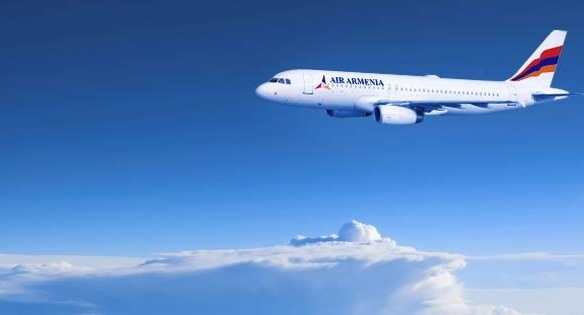Over the past two years the problem of the high cost of tickets has become quite topical in Armenia. The cost of the ticket for the Yerevan-Kiev flight is 500-520 dollars, for Yerevan-Moscow it is 200-300 dollars. The prices of tickets on flights from Armenia to Europe are 150 euros higher than the prices from Georgia to the same destinations. The price of a Yerevan-Prague-Yerevan flight ticket is 590 euros, while the ticket of a Tbilisi-Prague-Tbilisi flight costs only 330 euros. Many people prefer to fly from Armenia to Europe through Tbilisi.
The problem is even more complicated when viewed against the social background of Armenia. According to the Statistical Service, 32% of the country's population are poor today, the average salary is about 390 dollars. But despite the significant drop in oil prices, jet fuel prices remain almost unchanged. The high cost is accompanied by other problems. Over the past two years the number of airlines flying to Armenia decreased by one third. Czech Airlines, AL Italia, British Airways, Etihad and many other airlines have left the market.
In 2013 the government announced a policy of 'open skies', which implies an increase in the number of international airlines in the Armenian market, thus increasing the competition and as a result, a decrease in prices. But in fact, everything is reversed.
According to experts, the higher prices for airline tickets, the withdrawal of many airlines from the market and flights through Georgia are a result of the monopolization of the Armenian air transportation market by a number of Ukrainian and Russian airlines.

According to the Minister of Economy of Armenia, Karen Chshmaritian, Ukrainian and Russian airlines held the strongest positions in the Armenian market.
However, the monopolization was only a consequence of a series of unforgivable mistakes and opaque transactions carried out by the Armenian authorities in the field of civil aviation. According to the authoritative online publication Hetq.am, after several non-transparent transactions in 2003, the Armenian government provided the private Armavia company the exclusive right to carry out a number of flights, including the flights of the most profitable Yerevan-Moscow-Yerevan route. The owner of the Armavia company was Mika Limited, registered in an offshore zone and owned by big businessman Mikhail Baghdasarov, who was a member of the inner circle of the ruling elite in Armenia.
The transfer of exclusive rights on Yerevan-Moscow-Yerevan flights became a serious blow to the state company 'Armenian Airlines' (AA). The media reported that from the beginning of the reign of Robert Kocharyan, that is, since 1998, the company, which benefited until 1997, started to experience financial and technical problems.
"AA tried to achieve artificial bankruptcy from above, opening the way for Bagdasarov's company. In 2002-2003, the national airlines were in deep crisis, and Armavia's contract with the government marked the beginning of the end of AA. In 2003 AA stopped its flights, and on April 12th 2004 it was recognized bankrupt by decision of the Economic Court, Hetq.am writes.

Mikhail Bagdasarov
Meanwhile, Armavia, which received great preference from the government, has declared itself bankrupt 10 years after the start of work. Its owner Bagdasarov referred to the economic crisis in Armenia, financial difficulties, high prices for the services set by the International Airports of Armenia Company, and that the company's income didn't cover its expenses.
But, according to the experts, it was incompetent management which caused Armavia's bankruptcy, the format of the company, where neither the state nor the team had any leverage over the company's management on personnel and technology policy.
Armavia went bankrupt because of provincial greed. You cannot grant a man a whole industry when he has no assets in such a business, everything was acquired on a rental basis. Such a policy of a temporary worker is aimed at doubling, robbing and giving nothing in return. The arguments that supposedly the company's benefits do not cover its costs are unconvincing. This branch has always been profitable, and the company has accumulated debts from over more than 10 years, resulting in bankruptcy," the former head of the State Directorate for Civil Aviation of Armenia, Shahen Petrosyan, said.
However, the government has not taken any steps to examine the causes of Armavia's bankruptcy, and Bagdasarov has not suffered any responsibility for the collapse of this strategic sector.

After the bankruptcy of Armavia, the government conceived the idea of 'open skies', which has not worked. According to experts, after the bankruptcy of Armavia, they had to conduct complex research in the civil aviation sphere, analyze the causes of the bankruptcy and try to answer the question of how appropriate it was to hand over the whole civil aviation sphere into the hands of one person, and which corruption risks were present at the government's decision on the actual monopolization of the air travel market by a private company.
All this, and most importantly the lack of a national air carrier, has contributed to the collapse of the 'open sky' policy.
Meanwhile, the presence of a national carrier could help to restore the necessary balance in the market, the elimination of monopolies of certain foreign companies and the approval of healthy competition.
Today, Armenia is making attempts to create a new national carrier, particularly the Air Armenia company, which began to take its first tentative steps. It is still hard to say whether the conditions for the normal development of the company will be created or whether the government will decide to kill the goose that lays the golden eggs, like in 2003.






